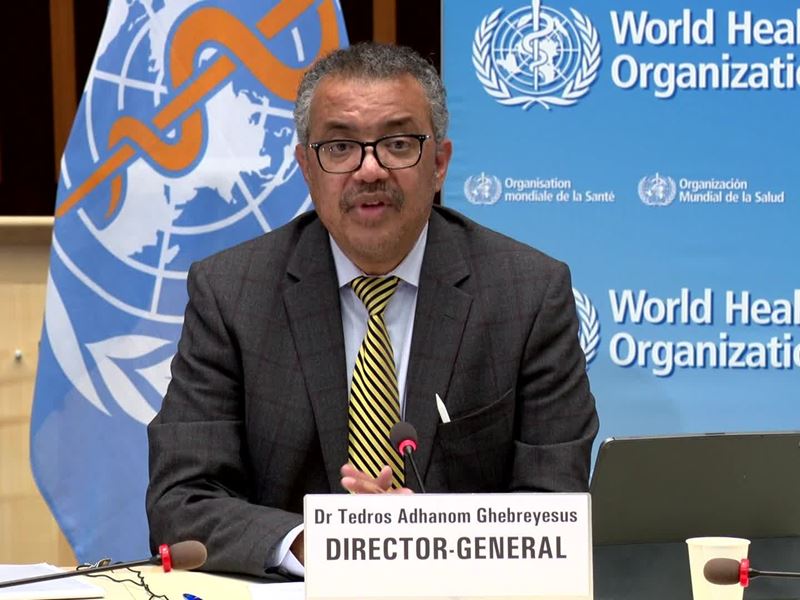WHO Director-General’s opening remarks at the media briefing on COVID-19 – 21 October 2021

Good morning, good afternoon and good evening.
I have often said that universal health coverage and health security are two sides of the same coin.
Both depend on health systems that are resilient, efficient and effective, and able to surge to respond to emergencies.
Health systems like that are a vital first line of defence against outbreaks with epidemic and pandemic potential;
but they’re also essential for promoting health, preventing communicable and noncommunicable diseases, and for reducing inequalities and inequities.
This week, WHO published a new position paper on building resilient health systems as the foundation of socio-economic recovery and development.
The position paper outlines seven policy recommendations, with specific actions in each area.
We urge all countries to implement these recommendations, and reap their benefits.
The backbone of every health system is its workforce – the people who deliver the services on which we all rely at some point in our lives.
The pandemic is a powerful demonstration of just how much we rely on health workers, and how vulnerable we all are when the people who protect our health are themselves unprotected.
A new WHO working paper estimates that 115 thousand health workers may have died from COVID-19 between January 2020 and May this year.
That’s why it’s essential that health workers are prioritised for vaccination.
Data from 119 countries suggest that on average, two in five health and care workers globally are fully vaccinated. But of course, that average masks huge differences across regions and economic groupings.
In Africa, less than 1 in 10 health workers have been fully vaccinated. Meanwhile, in most high-income countries, more than 80% of health workers are fully vaccinated.
Today, WHO and several partner organizations have issued a statement calling for action to protect health and care workers around the world:
First, we call on all countries to improve monitoring and reporting of infections and deaths among health and care workers.
Second, we call on all countries to ensure all health and care workers are protected and supported, with safe and healthy working conditions, regular salaries, pay equity, appropriate education, career opportunities and social protection.
Third, we call on all countries to ensure that all health and care workers in every country are prioritised for COVID-19 vaccines, alongside other at-risk groups.
Today I’m pleased to be joined by two women who represent millions of health workers around the world: Annette Kennedy, President of the International Council of Nurses; and Dr Heidi Stensmyren, the President of the World Medical Association, which represents the world’s physicians.
Thank you both for joining us. Annette, you have the floor, and then we’ll hear from Heidi.
[ANNETTE KENNEDY ADDRESSED THE MEDIA]
Thank you, Annette. Heidi, over to you.
[HEIDI STENSMYREN ADDRESSED THE MEDIA]
Thank you, Heidi, and thank you to both of you and your organizations for your continuing partnership.
More than 10 months since the first vaccines were approved, the fact that millions of health workers still haven’t been vaccinated is an indictment on the countries and companies that control the global supply of vaccines.
High- and upper-middle income countries have now administered almost half as many booster shots as the total number of vaccines administered in low-income countries.
In 10 days’ time, 20 people will meet in Rome with the ability to change that – the leaders of the G20 countries.
Between now and then, roughly 500 million vaccine doses will be produced. That’s the amount of additional doses we need to achieve our target of vaccinating 40% of the population of every country by the end of the year.
82 countries are at risk of missing that target. For three-quarters of those countries, it’s simply a problem of insufficient supply. The other quarter of countries have some limitations in their ability to absorb vaccines, and we are working to address those problems.
The target is reachable, but only if the countries and companies that control supply match their statements with actions – right now.
The barrier is not production. The barriers are politics and profit.
G20 countries have pledged to donate more than 1.2 billion doses to COVAX. So far, only 150 million have been delivered.
For most donations, we have no timeline. We don’t know what’s coming when.
Manufacturers have not told us how much COVAX will receive, or when we will receive it.
We cannot have equity without transparency.
Ahead of the G20 Summit next week, we plan to publish the new 12-month Strategic Plan and Budget for the ACT Accelerator, which will set out the actions and resources needed to achieve our targets.
It’s clear what needs to happen:
The countries that have already reached the 40% target – which includes all the G20 countries – must give their spot in the vaccine delivery queue to COVAX and AVAT;
The G20 countries must fulfil their dose-sharing commitments immediately;
Manufacturers must prioritize and fulfil their contracts with COVAX and AVAT as a matter of urgency, and be far more transparent about what is going where.
And they must share know-how, technology, licences and waive intellectual property rights.
We’re not asking for charity; we’re calling for a common-sense investment in the global recovery.
COVAX has the money and contracts to buy vaccines. What we don’t have is any visibility on when the manufacturers will deliver.
One of the clearest and strongest voices for the need to invest in vaccine equity is Gordon Brown, the former Prime Minister of the United Kingdom, and WHO’s Ambassador for Global Health Financing.
It’s my great pleasure to welcome Gordon today. Gordon, thank you for your continuing work and partnership, and leadership. You have the floor.
[GORDON BROWN ADDRESSED THE MEDIA]
Thank you, Gordon. We can only hope the G20 countries hear your call.
Margaret, back to you.





